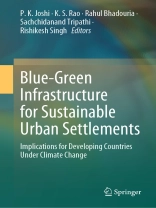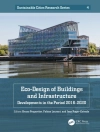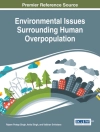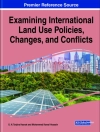Blue-Green Infrastructure (BGI) is now recognized as beneficial in terms of maintaining water flows and thermal comfort in urban areas. A framework of ecosystem services for urban settlements may be instrumental in bio-physical benefits as well as social and psychological benefits that will be assisting in adaptation and mitigating adverse effects of changing climate. Cities in developing countries, where the land cover is undergoing rapid transition, are characterized primarily by urban characteristics at the expense of natural ecosystems. The book aims to provide a state of the art of Urban Resilience and Sustainability linked to blue-green components of the urban environment. The challenges and opportunities in adopting the blue-greens as next generation infrastructure, particularly in the context of rampant urbanization and changing climate are also one of the focal areas of the book. The book also deals with multilevel community and stakeholders’ participation in developing and managing Blue-Green Infrastructure in urban centres of developing countries.
Currently, the focus of researches in urban ecosystem is moving towards exploring the role of blue-green components in ameliorating the negative consequences of urbanization and changing climate. This book bridges the knowledge gap between the existing understating of the role of blue and green infrastructure separately and in integration in city planning, particularly in mitigating and adapting to changing climate and environmental pollution.
Содержание
Blue Green Infrastructure for Urban Resilience and Sustainability in developing countries.- Strength and limitation of nature based solutions towards adaptation and mitigation of climate change in developing countries.- Role of Non Governmental Organizations in Promoting Blue Green Infrastructure.- Air Pollution Abatement through Blue Green Infrastructure in developing nations.- Role of Blue Green Infrastructure in achieving sustainable development goals in urban centres of developing countries.- Government policies related to Blue Green Infrastructure in developing nations for environmental resilience.
Об авторе
P K Joshi is Professor School of Environmental Sciences (SES) and Former Chairperson Special Centre for Disaster Research (SCDR), Jawaharlal Nehru University (JNU), New Delhi. His research is focused on environmental studies, with specialization in landscape characterization and climate change analysis. He has immensely contributed in understanding geosphere and biosphere interactions. His present research work contributes to assessing impact and vulnerability of climate change, and disaster risk reduction. Now, he has spent more than two decades in actively contributing to a wide range of training, research and academic programmes in the field of geospatial analysis. He possesses a scholastic record coupled with strong leadership skills and networking capabilities. He has made significant contribution as a ‘Scientific Administrator’, and in promoting ‘Scientific Research’ inter-alia through education, research publications and outreach activities. Kottapalli Sreenivasa Rao served as professor and head in the Department of Botany and Dean of Faculty of Technology, University of Delhi, India. He also served in different academic and research positions in various reputed organizations/institutes. He has guided 15 Masters (M.S.), 3 M. Phil and 24 Ph.D. students for their degrees in various Universities and has published about 25 books and more than 160 research papers in international and national scientific journals. He is member of various academic scientific societies and served as member in several committees constituted by the Government of India to address ecological and environmental challenges. His current area of research includes restoration of degraded lands using agroforestry and land rehabilitation techniques along with urban metabolism and urban ecology. Rahul Bhadouria is an assistant professor at the Department of Environmental Studies, Delhi College of Arts and Commerce, University of Delhi, New Delhi, India. He obtained his doctoral degree from the Department of Botany, Banaras Hindu University, Varanasi, India. He has published more than 24 papers, 25 book chapters, and 12 edited books in internationally reputed journals/publishers. His current research areas are, management of soil C dynamics to mitigate climate change, a perspective on tree seedling survival and growth attributes in tropical dry forests under the realm of climate change, plant community assembly, functional diversity and soil attributes along the forest-savanna-grassland continuum in India, recovery of degraded mountains in central Himalayas and urban ecology. Sachchidanand Tripathi is an associate professor at the Department of Botany, Deen Dayal Upadhyaya College, University of Delhi, Delhi, India. He obtained his doctoral degree from the Department of Botany, Banaras Hindu University, India. The areas of his interest are plant ecology, soil ecology of various ecosystems, ecophysiology and urban ecology. He has published more than 60 publications (including research publications, books and book chapters, conference proceedings) with journals and publishers of international repute. He is serving as an Editorial Board member of several reputed international journals. Rishikesh Singh is an Assistant Professor at Amity School of Earth and Environmental Sciences, Amity University Punjab (AUP), Mohali, India. His research interests include various dimensions of ecology and environmental science, viz., herbaceous vegetation analysis, soil carbon dynamics, land-use change and management, management of environmental contaminants, biochar amendment, tree seedling ecology, and urban ecology. He has worked on different ecosystems including dry deciduous forests and savannas, riparian landscapes, and urban and agro-ecosystems of the tropical region. His major contribution to science is in “Biochar and Agro-ecology”. Dr. Singh received the Young Scientist Award from NESA, New Delhi in 2022. He has published more than 80 Scopus-indexed publications in various international journals and books. He has contributed as editor of a few books published by Elsevier, Springer Nature, Wiley and CRC Press. He is serving as an Editorial Board member of several reputed international journals, e.g., Tropical Ecology, Biochar, Carbon Research, Frontiers in Forest & Global Change etc.












